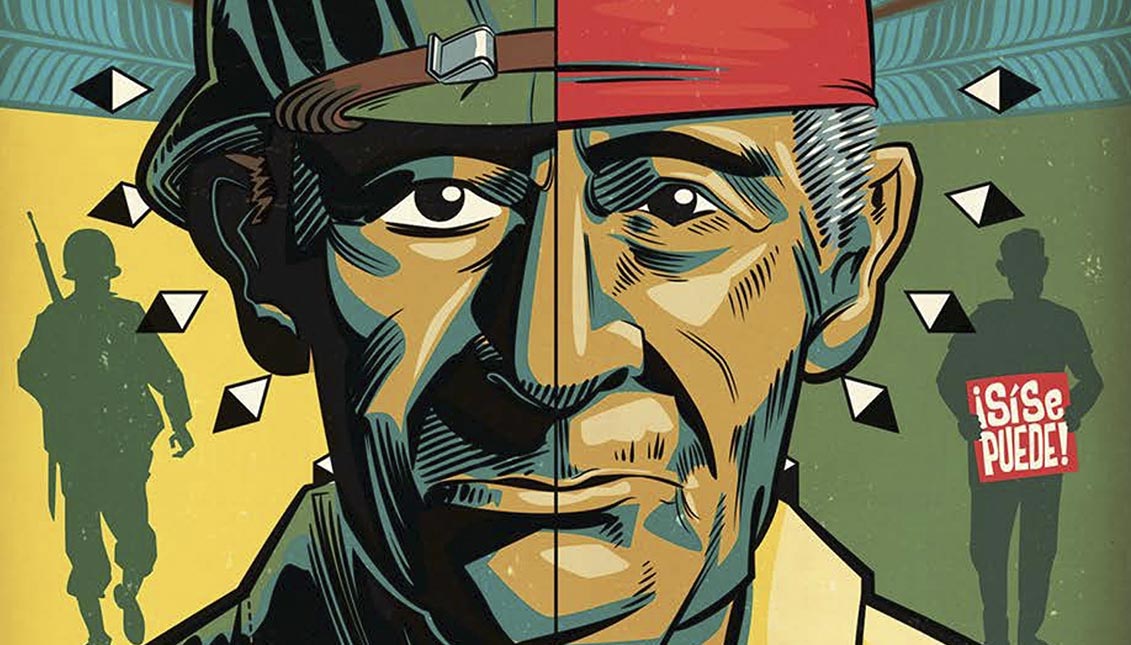
Tata Rambo, the unknown Yaqui hero from Arizona who could teach Trump a thing or two about people’s rights
The journalist Henry Barajas honors the memory of his great-grandfather and activist Ramon Jaurigue and all Native Americans in a graphic novel released on…
Ten thousand Native American people live in Mexican states across the border, where the U.S. Trump’s migratory politics has divided families and left them in legal and physical limbo, in a nobody’s land. But it was a time when activists from tribes fought against repression and won.
Native from the Pascua Yaqui tribe and a WWII veteran, Ramon Jaurigue was one of many forgotten heroes. In 1970, he founded “La Voz de M.A.Y.O (Mexican, American, Yaqui, and Others), an organization that fought for the Yaqui community federal recognition, and for Latinxs and Native American to have same rights than white citizens in Tucson, Arizona.
After discovering some M.A.Y.O newsletters, Henry Barajas, Tata Rambo’s great-grandson, tells his fascinating history in a graphic novel, “La Voz de M.A.Y.O: Tata Rambo”, together with J.Gonzo artist’s illustration.
Sadly, Ramon Jaurigue and the organization he co-founded Mexican, American, Yaqui, Others (M.A.Y.O.) were never recognized for their work. Thankfully, Jaurigue and M.A.Y.O. self-published their community newsletter La Voz De M.A.Y.O. unknowingly documenting their efforts to inform everyone of what was happening around them. This was my chance to amend the history and finally showcase these hidden figures.
If it weren’t for their civil disobedience, the tribe would’ve been displaced. I think it’s because of MAYO the elders were able to preserve their rituals, language, and history.
During the infamous town hall protests against the interstate 10 freeway on January 20th, 1970 they made buttons that read “NO WALLS.” Tucson is an hour from the Mexican border, so he was against barriers from our brothers and sisters long before it was a national issue. I took him to his last protest in solidarity with Rosa Robles Loreto to avoid deportation and being separated from her family. He was a Chicano activist to the very end.

I worked for the Arizona Daily Star and we would get photos of deceased migrants sunburnt, bloated stranded in the desert from Border Patrol’s Public Information Officer. But we only see migrants face down in ditches or caged. You will never see them cooking and farming our food, or taking care of our kids. The narrative of Latinx people is that we’re lazy but we’re taking everyone’s jobs. We don’t vote but lawmakers use gerrymandering to suppress brown people’s voice. Native Americans are only in the news when it’s too late and our natural resources being bought or sold. "La Voz De M.A.Y.O." is a rare piece of text that shows us fighting suppression and winning.
RELATED CONTENT
The powerful have written history and will continue to whitewash people of color. I feel that the comic book medium is the best way to tell these stories. It’s one of the most economical ways to do it. Film and television need million-dollar budgets to get the mass appeal. It’s hard for Latinx people to secure that kind of financial backing.
I would encourage everyone to watch John Leguizamo’s Latin History for Morons on Netflix. His thoughts on feeling invisible and the frustration you get when you find out that brown people have been in every major war in the US, but those troops aren’t recognized for sacrifice. There’s a movie about WWII Navajo “wind talkers” starring Nicholas Cage.
We need to do a better job of recognizing Native Americans and Latinx people’s valiant efforts for this country.

"La Voz De M.A.Y.O." started out as prose. I put my dreams a comic book creator aside to spend two years writing for the Arizona Daily Star and Tucson Weekly—but it wasn’t until John Lewis’ March was published, I realized I needed to take this to comics. Jaurigue’s story does lend well to a film or television adaptation, but "La Voz De M.A.Y.O." Tata Rambo was written for the comic book medium.
That this is just one story in what could be more Latinx voices and figures whitewashed. Art Spiegelman's Maus made me realize that comic books deserve to be in the classroom. The work that M.A.Y.O. and Jaurigue accomplished only 50 years old. I would like to excavate more skeletons in the imperviable closet of history.
I think I got my drive and political attitude from him. I’ve been a writer my whole life not know he was prolific with his typewriter in the 1970s. I’m fortunate to have someone in my family that I can look up to and share with the world.













LEAVE A COMMENT: